On July 15, 2019, lawyer-turned-real-estate-mogul Ong Chih Ching rang in her 50th birthday with a burning desire to be more successful. In the past 13 years, the co-founder and executive chairman of KOP Limited, a property development and entertainment company, has broken many firsts. It started in 2007 with The Ritz-Carlton Residences (the hotel chain’s first such branded residential property in Asia) followed by Hamilton Scotts, which caused a seismic shift in the staid world of luxury residences when it debuted their sky garages—a futuristic concept that could’ve been plucked from The Jetsons. Even after elevating the luxury quotient and carving a name for themselves as propagators of high-end real estate, Chih Ching would go on to outdo herself by embarking on her most ambitious project to date—Wintastar Shanghai—a multibillion-renminbi integrated resort in China that touts the world's largest indoor ski and snow park. A person of such unflinching drive and foresight may conjure thoughts of being a megalomaniac. But in the flesh, Chih Ching is incredibly self-aware, has no airs and emanates a curious energy that at times, seems almost child-like—which explains her borderline unhealthy obsession with Minions and Olaf the snowman from Frozen. Her sonic delivery is genteel and articulate, redolent of her days as an attorney. While this softer side of Chih Ching may be unassuming, she still possesses a razor-sharp focus to achieve a total of $10 billion in assets under KOP’s portfolio. “These days, it’s not about making a name for ourselves, but maximising shareholder returns,” she says. To help her fulfil her objective is none other than Chih Ching’s co-founder, Leny Suparman, who is the linchpin of the firm. Despite being 5 years younger, Leny keeps Chih Ching in check without limiting her appetite to defy and raise the bar in real estate—an industry known for being predominantly male. Steadfast and armed with a keen eye for structure and detail, Leny has also put her 9-year stint at CBRE to good use by shepherding the company into profitability. “As a public listed company, not everybody understands the vision, and not all money is patient. It is always a continuous effort to keep communicating that to the public and even within the company.” The duo, who met in 2000, started off as friends before taking the plunge as business partners. Since then, this transition has demonstrated staying power, akin to those of Larry and Sergey, Gates and Allen, Ben and Jerry. Yet, with all the pinnacles of success they’ve reached since KOP’s inception, the pair counts their friendship/partnership as the biggest accomplishment of them all. And much like the story of Damon and Pythias—two best friends who share an intimate bond and love each other deeply—this modern-day tale does live up to expectations.
An Epic Conversation with Ong Chih Ching and Leny Suparman
WY-LENE YAP: What have you been dreaming about lately?
ONG CHIH CHING: Building a 22nd-century township in Jiaxing; it’s about envisioning what the future will look like and how we can contribute towards that. Jiaxing is a very strategic location between Shanghai and Hangzhou, and it is also the founding city of the communist party, so we are very fortunate to be advising the government as a master planner. This dream is a very, very big burden because you need to know how are people going to live in 50 years’ time, or 100 years from now. At the moment, there has been tremendous progress on the technology front with autonomous vehicles, net-zero carbon emissions, food from stem cells… all of which will become part of the future. But is the city ready? Also, with a blank canvas like this, we need to ensure that our ideas can be executed.
WY-LENE: You’re building your very own SimCity. Have you played that video game before?
LENY SUPARMAN: Not really, but we understand the concept of it.
WY-LENE: Do you share the same dream as her?
LENY: I support her dream by ensuring that the company is sustainable in the long run. We are always doing projects that are a first-of-its-kind, which means that it is always going to be an uphill task in terms of the concept, research, execution, and getting buy-in from partners, investors, and government officials. Every project always takes a long time. Down the line, I hope we can replicate something, which will make things a little smoother and easier on our end.
WY-LENE: As a master planner, how do you balance idealism and practicality?
CHIH CHING: You dream 100%, but the execution is probably about 60%. And in reality, you’re probably only at about 40-45% of the market. I say 22nd century, but we’re actually building for the next 10 to 20 years. Personally, I feel that the next 10 to 20 years are going to be very similar to the next 100 years of living. Ultimately, it’s a question of whether it can be executed. For SimCity and the other video games we play, we can be very irresponsible and go all the way. But that is as much as the game allows you to. For me, I can go on and on, but there are times when we need to scale back.
WY-LENE: Aside from Jiaxing, I’m aware that you spend most of your time in Shanghai because of Wintastar. How’s progress coming along, and are you on track to open in 2022?
CHIH CHING: Within the next one or two months, we will top out of the first phase.
LENY: We’re on schedule.
CHIH CHING: And we should be able to open during the first quarter of 2021. For the second phase, we have also started construction and should finish by 2022 to coincide with the Winter Olympics, as there will be a lot of publicity.
WY-LENE: What has been the most challenging aspect so far undertaking such a massive and complex project with multiple parties being involved?
CHIH CHING: The most difficult part was to convince partners to work with us, the Chinese government to give us land and finally, getting investments. A lot of real estate companies tend to bid for a piece of land first, before thinking about the concept. We do that as well, but there are also instances where we have a concept in mind already, and it’s about finding the right home for it. Wintastar was one of those concepts. Subsequently, we decided that Lingang was the right location since it’s 20 minutes from Disneyland—you need to have a cluster.
LENY: We also had to redo the design and refine it… that is why this project has taken longer than expected.
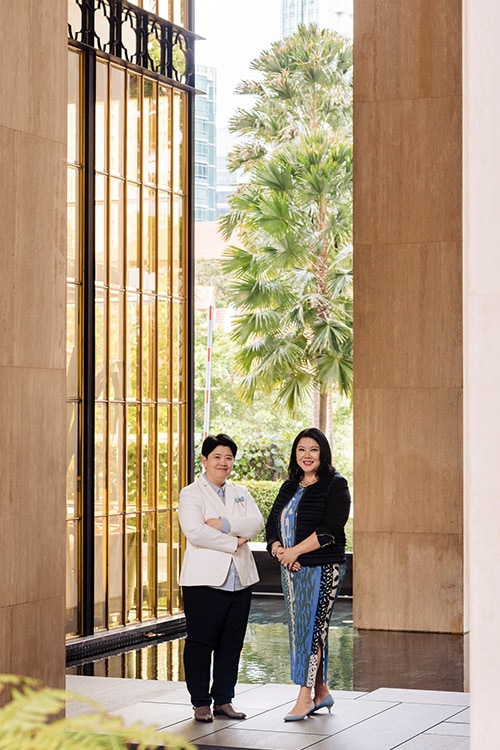
"Although we are small, we stand a chance against all the big, giant companies in China because of our creativity and innovativeness."
WY-LENE: Where does your endurance and stamina come from? I remember that it took 9 months and over 6,000 email messages for you to secure The Ritz-Carlton Residences.
CHIH CHING: Leny and I are driven by our sense of responsibility. Once we say that we are going to do something, we will complete it regardless of how difficult it is. Almost every project has been difficult, because we’re breaking new ground. We take it in our stride and I think having another person helps. Sometimes when I want to give up, she would say, “No, don’t give up.” On days when she laments, “I’m stupid, why did I agree to do this?” I would convince her to press on. It’s a constant thing, but we always finish what we started.
WY-LENE: Do you sometimes feel like you’ve bitten off more than you can chew?
CHIH CHING: All the time, and somehow we end up doing more. [laughs]
WY-LENE: Do you see any similarities or differences between the property market in China and in Singapore?
LENY: It’s very different, because there are a lot of policies in China. The way we navigate in China is very different from a Chinese developer and how they would look at the Chinese market. It’s almost kind of divided. Whereas in Singapore, it’s the same playing field for everybody—foreign or local developers. Singapore is like a traditional real estate, if you look at it 10 years ago or 10 years later, there’s really not a lot of changes and room to play with. China is dynamic and ever-changing. Every 5 years, there’s a new trend, new demand, according to what the government wants as well as the consumers, bearing in mind the macro global economics. People advance so quickly, their taste changes, aspirations, etc.… and to us, we always feel that China is much more exciting. It is a place where KOP can thrive in.
WY-LENE: China is your playground.
LENY: Yes, in a way. It’s the right playground for us because they appreciate what we do and are always looking for something new. The kind of projects that we’re doing now excites the Chinese government and we are good at it, which a local developer might not be able to pull off. That’s our competitive edge. Although we are small, we stand a chance against all the big, giant companies in China because of our creativity and innovativeness. But, we still want to do projects in Singapore because of its stability. Ultimately, there are always pros and cons. As a company, we want to be able to leverage on both countries.
CHIH CHING: The key difference is that Singapore is a very simple and transparent market. With low barriers of entry, the margin is very little. In China, a company like us will thrive since their market is so huge. I always remember that they would tell me how many billions of dollars... whereas in Singapore, $1 billion is a lot. Every above-average real estate developer in China is a billion-dollar company.
WY-LENE: Back home, it’s been a while since you developed any residential properties. Anything new on the horizon?
CHIH CHING: At the moment, we're developing a 27-unit high-end luxury apartment in Dalvey road that ranges from $3.5m onwards. We have been known to develop $10m properties, and now we are offering something of similar quality but at a fraction of the price. The main difference between us and a lot of developers is that we’re the ones who roll our sleeves up and choose the marble, tiles, everything. The rest have project managers. Even though we’re relatively small and do not do a lot of projects, our reputation still remains as luxury developers.
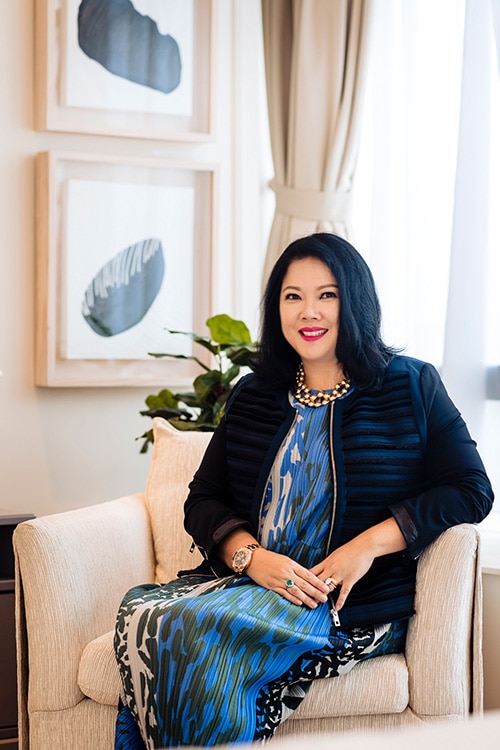
WY-LENE: What can potential buyers look forward to?
LENY: Dalvey Haus is real luxury comfort, without trying too hard. I think the days of trying to impress others as well as ourselves are over. In a way, this will cater to people who have been there and done that. What you really want is to be in an exclusive address and neighbourhood with nice amenities.
WY-LENE: James Dyson made the news a few months ago when he bought the priciest penthouse for $73.8M. Do you think he overpaid?
CHIH CHING: If you look at places like Paris, London, New York, Los Angeles, and even Shanghai, to spend about USD 50 million on real estate is nothing. That's why I feel that Singapore is underpriced because of the government’s regulation and property tax. I always get asked, “What do you think of the Singapore market?” And I say, “You don't need a crystal ball, just go and ask the government. Because everything is regulated.” It’s very policy-driven. The biggest force measurer is the government, which shouldn't be. Usually, it's market-driven.
WY-LENE: What is your thought process like when you evaluate a potential property acquisition or development?
CHIH CHING: Once we identify a piece of land, we will usually think of how to maximise the land use—that is why we layer it with so many different components. Instead of making the usual $100, we want to make $250.
LENY: But there are some investments like Prudential tower, where we didn’t really have to do much and still made money.
WY-LENE: Does it differ when it’s residential versus commercial?
CHIH CHING: There is a big difference when we are looking at hospitality because location is very important and how it will fit into the brand strategically. When we’re looking at commercial properties, it’s purely about how much money we can make out of the building. We don’t currently do retail, because a long time ago, we already knew that retail properties were a sunset sector. For residential, in the beginning, it was really to change the world. At that time, everyone was about talking about luxury without knowing what it truly was—that was why we felt like we could make a statement. Till today, with The Ritz-Carlton Residences, we can go around Singapore and stand tall.
Now that everyone is trying to do high-end developments, we always want to be more sophisticated in the residential space. But sophistication doesn’t mean you slap gold and marble everywhere. Sometimes, it’s in the space planning. I always use this example that we’re the kind of developers where you only know how good we are until you move in. Personally, I live in The Ritz-Carlton Residences and it is very difficult for a developer to live in a block that they’ve developed because sometimes when you make mistakes, you get stoned or criticised. But I do have very good neighbours who come and thank me for building it. And that makes me very, very proud.
LENY: We also have repeat buyers and loyal followers of KOP who trust that whatever we do is something they will want to live in and pass down to generations.
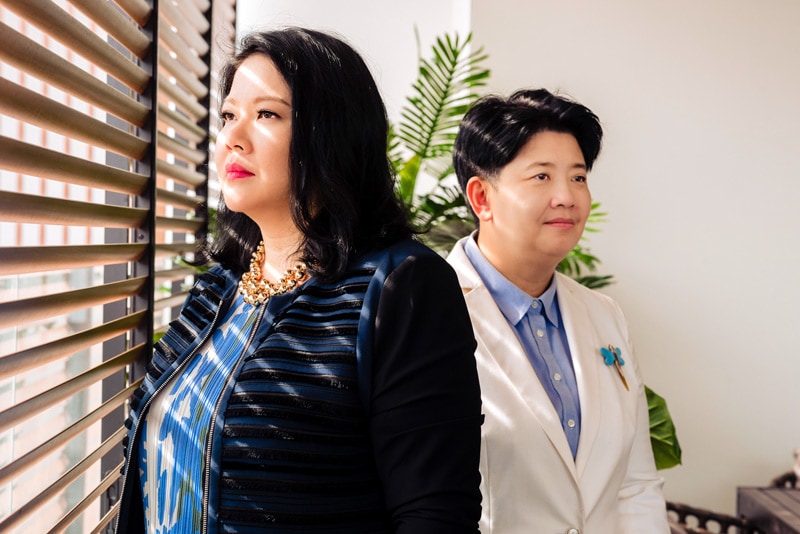
WY-LENE: Speaking of hospitality, you have two Montigo Resorts: one in Nongsa and the other in Seminyak. Which performs better?
CHIH CHING: In terms of occupancy, Bali does better. Seminyak is a tourist destination. If you look at Nongsa, it is more of a two-day business resort, so Friday and Saturday are highly popular. Otherwise, the midweek is quite low. If you are not constrained by the weekend, it is better to come on a weekday. You enjoy a better rate, and it’s not so crowded.
LENY: But in terms of rates, I would say Nongsa is doing better, as it is more established and has been around for a longer time.
CHIH CHING: To add, Montigo Resorts Nongsa does better in terms of total revenue. Mainly because in Seminyak, guests tend to stay in and dine out. Nongsa has a lot more comprehensive activities and a captive audience.
LENY: Nongsa is more mature as well. Montigo Resorts Seminyak just fully opened, so it’s a matter of time before it catches up.
WY-LENE: For Montigo Resorts Seminyak, you’ve added another 60 rooms, which are now completed, right? What else sets them apart aside from the fact that you can purchase villas in Montigo Resorts Nongsa?
LENY: Montigo Resorts Seminyak is right in the heart of Seminyak, so it’s like a city hotel. Whereas Montigo Resorts Nongsa is a destination, all-villa resort. The same DNA applies to both because Montigo Resorts is family-friendly, and we always have three zones: 1. TIIGO, the beach club 2. a spa area 3. a kids’ club. All the rooms are also very spacious, so you can sleep a minimum of three people.
WY-LENE: Who came up with Tilo the mascot?
CHIH CHING: Leny is born in the Year of the Tiger and I’m born in the Year of the Rooster, but she likes to call it a chicken. She enjoys bullying me. So in order to create an important persona of myself, I termed Tilo the Prince chick.
LENY: No, I bestowed that title upon you! It’s true! Since you wanted the mascot to be a chicken, I came up with the story of Tilo, a Prince chicken from Jamaica who loves to explore the world since Chih Ching is an explorer by nature too.
CHIH CHING: And Wintastar’s mascot is a tiger.
WY-LENE: Ah, I see.
LENY: She returned the favour [laughs].
CHIH CHING: I wanted the chick to be cool and all, but now it just looks like a dumb-dumb. Ironically, I wanted the tiger to look a bit silly, but it turned out to be quite cool, so I’m not very happy about that [laughs].
WY-LENE: In our past conversations, you talk about Sam [Goi] fondly. With him taking a 20 per cent stake in your company and becoming your mentor, is there anything that he has taught you?
CHIH CHING: I actually prayed about wanting to have a mentor. He’s been great and through him, we know what are the perimeters to follow in order to become truly successful. Separately, he provides another layer of checks and balances and once we have thoroughly cooked a deal, we go back to him for his final approval.
LENY: Since I’m always the one who’s looking at the bottom line and ROI, he has really galvanised the way we think about our cash flow. For example, in the past, I would be quite happy with 3 to 5 years, but for him, it’s even shorter.
CHIH CHING: Besides the obvious of doing business judiciously, Sam has humility despite being very successful. He’s probably the top 10 or top 5 richest men in Singapore who has a very important presence in China, yet he’s still very accessible. He gives people the time of day. If he tells you he's going to do something, he does it. He also has the patience to sit down and teach you how to be a better person.
LENY: Like the importance of having moral values.
CHIH CHING: He’s very frugal to himself, but is very generous with his donations to the grassroots. I think he takes pride in mentoring us, which is always good.
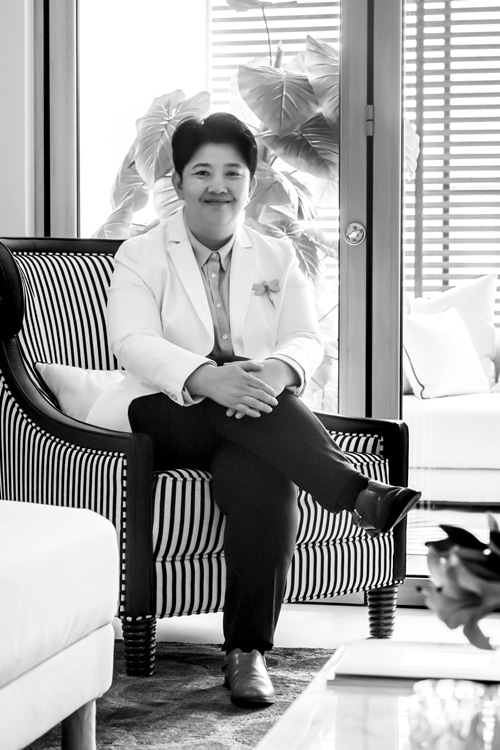
"It’s very difficult to be friends and do business together. The thing with us is that no matter what, we are one, and interestingly, we’ve always been viewed as one."
WY-LENE: What’s the biggest risk you have ever taken?
CHIH CHING: I think starting KOP.
LENY: And me joining you? [laughs]
CHIH CHING: Yeah, really! I think the greatest risk was in the beginning.
WY-LENE: What do you think is your proudest accomplishment to date?
LENY: Proudest? I don’t know… there are a few.
CHIH CHING: Actually, I think every single project that we have done is an accomplishment in itself. But the proudest one has to be our friendship, right?
LENY: Yeah, our partnership [tears up].
CHIH CHING: [tears up simultaneously] It’s very difficult to be friends and do business together. The thing with us is that no matter what, we are one, and interestingly, we’ve always been viewed as one. Most of time, people would address us as Chih Ching and Leny, never Chih Ching or Leny. We’ve become fused into one.
WY-LENE: Have you tried fusing your names together?
CHIH CHING: We did! We have a boat and it’s called Chilen.
LENY: We had a few. We were up to Chilen 5, right? In 2010, we had a boat business and we were the distributors for Princess Yachts in Singapore and China.
CHIH CHING: We did it for around a year and a half to two years, because we were crazy about boats. Eventually, we kept some of them.
WY-LENE: In the past 19 years, how have you seen each other grow and evolve?
CHIH CHING: Good question, we have never really thought about it.
LENY: I think in terms of looks, she looks better now!
CHIH CHING: Yeah, that’s because she thinks that she has made me look better—I used to wear glasses.
LENY: She was more serious when I first met her. And maybe not as open-minded, exposed and dynamic. She's always had it in her, but being a lawyer didn't really give her that side. She is also more relaxed than before.
WY-LENE: But isn't that an age thing?
CHIH CHING: Yes, but it was also the industry I was in. When I used to be the boss of a law firm, it was a pressure-cooker. When Leny first joined, the company was still a law firm, and she would be the only one who laughs in the office. My partners would come to me and say, “Why is there laughter?” That was very unusual because your clients want you to be fierce so that you can negotiate contracts for them or litigate better. At the same time, the work, the opponents, it’s all very negative energy. In the business of real estate, you’re building beautiful things, looking at pretty things, it’s more relaxed and there isn’t really anybody you need to fight with. The only person would probably be Leny [laughs]. The whole environment is a lot more positive compared to a law firm. Do you have anything else to add? We became fatter?
LENY: [laughs] No! She’s become more mature now and she listens. You’re more sensible too.
CHIH CHING: But that’s a lot to do with Women of Worth (WoW). After being amongst women, who are all successful in their own right, I began to realise a common trait. The difference between us and men. Women think about building a legacy whereas men think about profitability. These days, it’s not about making a name for ourselves, but maximising shareholder returns. There are a lot of companies that are very successful and make a lot of money, but nobody knows about them. Is it more important to make a name for yourself, or is it more important to make money? If we ask all the women at the WoW dinner, everyone would say the former. If I have changed or evolved, it’s because I had that revelation in 2017.
WY-LENE: Which Women of Worth dinner are you referring to?
CHIH CHING: The special year-end gathering in December 2017, when everyone was talking about their achievements, what they wanted to be, their aspirations... that was my turning point.
LENY: You had an epiphany! See Wy-Lene, look at what you’ve done. Thank you, you’ve made her into a more sensible version 2.0.
WY-LENE: There are moments in life when you meet someone or are put in a situation resulting in an unexpected revelation because for the longest time, you had horse blinders on.
CHIH CHING: Yes, exactly! For me, I was trying to build a name and legacy. Through WoW, I learnt the importance of taking the time to observe and listen to people, and be open-minded. You will earn not learn a lot.
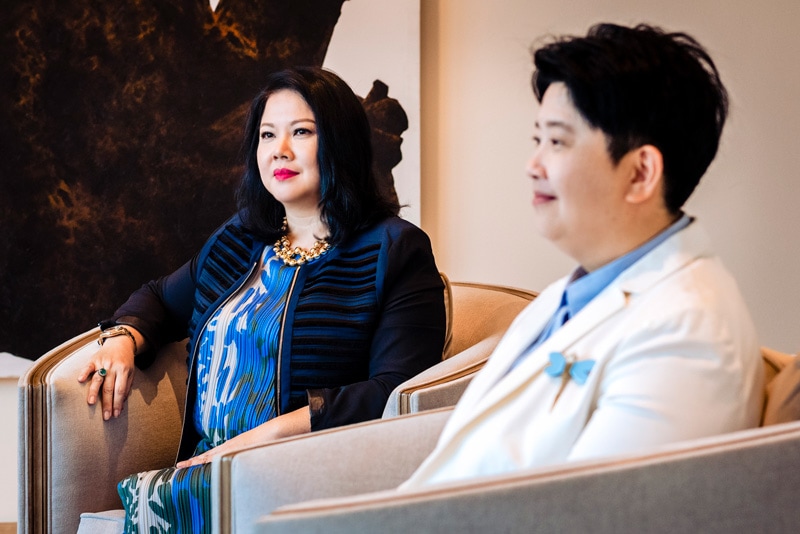
WY-LENE: So how have you seen Leny evolve?
CHIH CHING: She's become ‘bossier’ than ever and this isn’t a negative thing. It’s not easy to be a boss. I’m not the CEO, because I’m not bossy enough. Some people try to rule by being a tyrant. They order or nag, but their staff might not be convinced to carry out their instructions. They do it because of the person’s title. In Leny’s case, she always knows how to tell people to do things for her, without actually telling. This is the biggest part I admire about her. For example, she will not ask you to bring her a glass of water. Instead, she will say, “I’m thirsty, I’m thirsty!” Next thing you know it, a glass of water arrives. She has a very amicable way of bossing people around and making them do things for her willingly. It is a way of bossing, in my definition. She’s also a lot more confident now to ask people to do things as well. And that confidence stems from a good track record, more experience and having more humility.
WY-LENE: Is there something that still surprises you about each other?
LENY: It’s not so much of a surprise, but I still get amused by her. If she no longer amuses me, then I think I will be quite sad.
CHIH CHING: I’m her toy.
LENY: Maybe ‘amuse’ isn’t the right word. It’s a term of endearment. To be honest, I’m always impressed by her. I’m her biggest fan. I love to watch her speak and would video all her speeches! She’s the best.
CHIH CHING: On my 50th birthday, Leny gave a speech and after that, my uncle came up to me and said, “I think Leny is your mother.” Likewise, we are fans of each other. I go to her for advice on what to say and what not to say, which is quite incredible because she is 5 years younger than me. Nothing really surprises me about Leny except when she knows the name of a marble, or when she suddenly comes up with a construction term.
WY-LENE: What do you think is the key to having such a strong and successful partnership?
CHIH CHING: Trust in each other.
LENY: And the chemistry.
WY-LENE: I must say that I’ve never met anyone who has the level of connection and bond that both of you share. It’s truly special and one-of-a-kind. Are there any traits you admire in each other?
LENY: In terms of work, she is quite a genius. Who knows how to build the world’s largest indoor ski resort without any experience? She’s actually the person who sits in front of the engineers and the experts at Ski Dubai, and tells them what to do! They are in awe of her. I don’t know where she gets it from, but she can basically do anything. I admire her thought process as well. She thinks very differently from many people. It can come across as disorganised, but after a while, it makes a lot of sense. I have immense respect for her too. And with respect comes love.
CHIH CHING: I’ve always admired Leny for being very wise and I look to her for wisdom. You know, I'm like a kid who likes to play a lot, so I'm very blessed to have her to rely on.
WY-LENE: What is the most valuable thing that you have learnt from each other?
LENY: She has taught me humility, to give people the time of day, and to work hard and play hard. I’ve always been a maverick, but with her, it’s on a whole different level. I never thought someone could be 10 times crazier than me. Now, I’ve become the sensible one.
CHIH CHING: I used to be a very rash and less considerate of people’s feelings as I found success at quite a young age. But I learnt from Leny how to be more diplomatic and comfortable in my own skin, and not be afraid of what others think of me.

